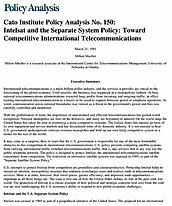International telecommunications is a multi-billion-dollar industry, and the services it provides are crucial to the functioning of the global economy. Until recently, the business was organized in a monopolistic fashion. At best, national telecommunications administrations extracted huge profits from incoming and outgoing traffic, in effect treating international telecommunication as a luxury to be taxed to support domestic postal or telephone operations. At worst, communication across national boundaries was viewed as a threat to the government’s power and thus was carefully controlled and monitored.
With the globalization of trade, the importance of unrestrained and efficient telecommunications has gained world recognition. National monopolies are now on the defensive, and many are beginning to unravel. On the world stage the United States has taken the lead in promoting a more competitive structure. The United States has opened up most of its own equipment and service markets and has deregulated some of its domestic industry. It is not unusual to hear U.S. government spokespersons criticize overseas monopolies and hold up our own fairly competitive system as a model for the rest of the world.
It may come as a surprise, then, to learn that the U.S. government is responsible for one of the most formidable obstacles to free competition in international telecommunications. U.S. policy prevents competing satellite systems from carrying international public switched telecommunications traffic, that is, any services that in any way use the public telephone network. The policy is designed to protect Intelsat, the international telecommunications satellite consortium, from competition. The restriction on alternative satellite systems was imposed in 1985, as part of the “Separate Satellite System Policy.”
U.S. attempts to protect Intelsat from competition are groundless and counterproductive. Protecting Intelsat helps to sustain an obsolete, monopolistic structure that routinely overcharges users and restricts trade in telecommunications services. More is at stake, however, than lower prices, greater efficiency, and improved trade opportunities — important as all those things are. The issue is also one of how the United States defines its role in the post-cold-war world. The protection of Intelsat is a classic example of how political and strategic concerns held over from the cold war are now handicapping the U.S. economy’s ability to respond to new global economic challenges.
About the Author

This work is licensed under a Creative Commons Attribution-NonCommercial-ShareAlike 4.0 International License.
